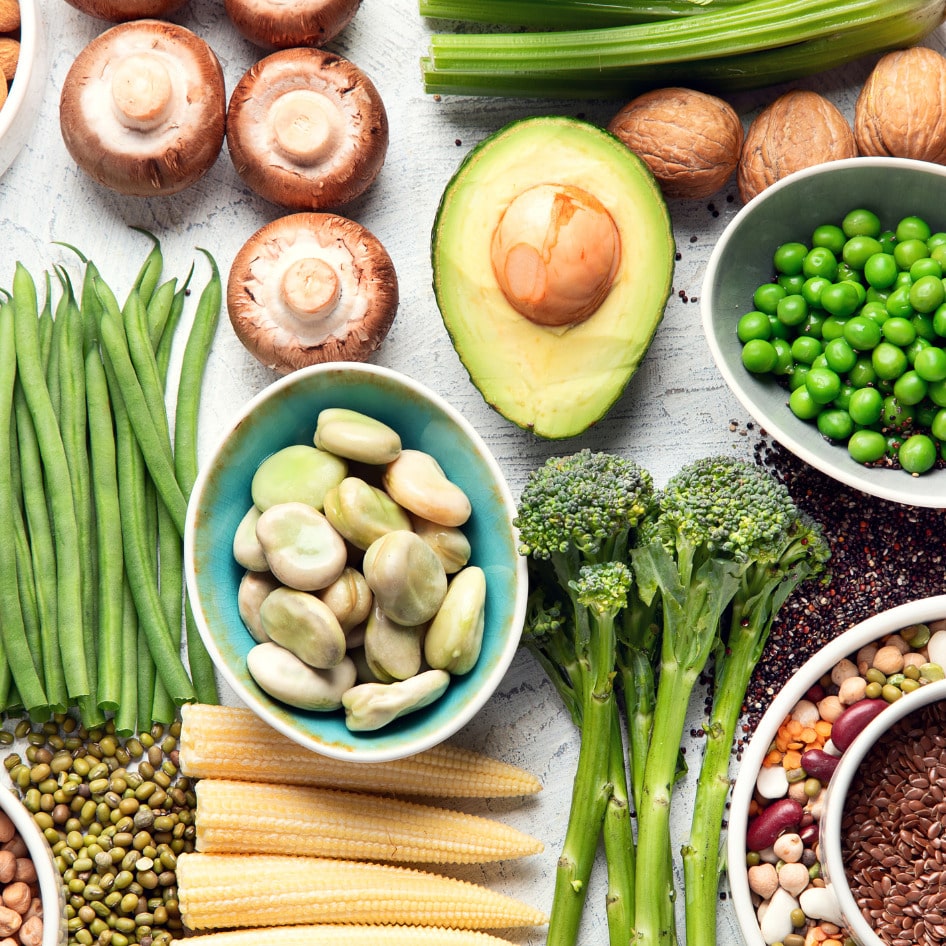Veganuary is bigger than ever. In 2023, more than 706,900 people got involved in the initiative, which supports and encourages participants to give up all animal products for the month of January. This was up from 2022, when 630,000 people got involved, and a huge jump from 2020, when it had 400,000 sign-ups. If this pattern continues, Veganuary 2024 is set to be huge. If you’re getting involved, we’ve gathered 31 interesting, exciting, and, in some cases, shocking facts to keep you motivated all the way through the month (and hopefully far beyond).
31 vegan facts for Veganuary
1 You can get all the nutrients you need from vegan food
Yup, it’s true. There are a lot of misconceptions about the nutritional quality of vegan diets, but if you eat a wide variety of plant-based, whole foods, you should be able to get more than enough protein, fiber, vitamins, and minerals. In fact, research suggests this is one of the healthiest ways to eat. Find our guide to a whole food, plant-based diet here!
Important note: vitamin B12 can be tricky, and some may choose to take a supplement to ensure they’re getting enough. However, it is present in fortified foods, including nutritional yeast, cereals, and some vegan meat and dairy products.
2 Veganism has been around for centuries
While the word “vegan” was invented in the UK in the 1940s, it’s important to note that this lifestyle isn’t a new fad. In fact, people all over the world have followed plant-based diets for centuries. According to The Vegan Society, evidence suggests that 2,000 years ago, some people were choosing to avoid animal products, and the lifestyle was prevalent across ancient Indian and Mediterranean societies.
 Netflix
Netflix
3 The people of the ‘Blue Zones’ eat predominantly plant-based foods
If you need more motivation to stick to a plant-based diet, Netflix series Live to 100: Secrets of the Blue Zones will leave you feeling inspired. The show follows explorer Dan Buettner as he travels to the world’s five hot spots for longevity, Okinawa, Japan, Sardinia, Italy, Ikaria, Greece, Nicoya, Costa Rica, and Loma Linda, California, known as the Blue Zones. The people of these communities have many things in common, but one key factor is diet. Most of them eat predominantly plant-based foods! Find out more here.
4 A whole food, plant-based diet is good for heart health
Heart disease is not just the biggest killer in the US, it’s the biggest cause of death in the world. In fact, it’s responsible for a third of all deaths globally. But, by switching to a whole food, plant-based diet, multiple studies note that you may be able to significantly reduce your risk. Follow our guide to heart health to find out more.
5 It can also reduce your risk of certain cancers
Eating more plant-based whole foods may also decrease your risk of another major global disease, cancer. Three common types pop up consistently in studies: breast, colorectal, and prostate. Find our deep dive into the research here.
 Unsplash
Unsplash
6 The WHO says processed meat and red meat are carcinogenic
Plant-based whole foods may decrease your risk of cancer, but certain meat products could actually increase it, research suggests. In fact, the World Health Organization has actually classified processed meat as a Group One carcinogen, which means it is known to cause cancer. Red meat is classified as a Group Two carcinogen, which means it is probably linked to cancer.
7 Cheese might actually be addictive
You’ve likely heard, or even felt yourself, that cheese is one of the hardest animal products to give up—but this isn’t just to do with taste. Cheese actually impacts our brains. “Cheese keeps you coming back for more,” Ashley Kitchens, MPH, RD, LDN, owner of Plant Centered Nutrition, told VegNews. “It contains a protein called casein that releases casomorphins. When you eat cheese, it triggers dopamine, the ‘feel-good’ hormone, production in your brain.” Find out more here.
8 A plant-based diet is associated with better mental health
A plant-based diet is not a fix-all solution for any health problem, including mental health issues. But eating more whole foods may be able to reduce your risk of suffering from depression (this study links mushrooms with a lower risk of depression), stress (check out this study on the benefits of walnuts for stress), and even post-traumatic stress disorder (find the study here).
9 And it can reduce your risk of type 2 diabetes
According to the Centers for Disease Control and Prevention, approximately one in 10 Americans have diabetes, and for most, it’s type 2. Multiple studies suggest that you can reduce your risk of type 2 diabetes by eating more plant-based whole foods, and some even suggest you may be able to help reverse the condition by doing so. Find more studies on type 2 diabetes reversal here.
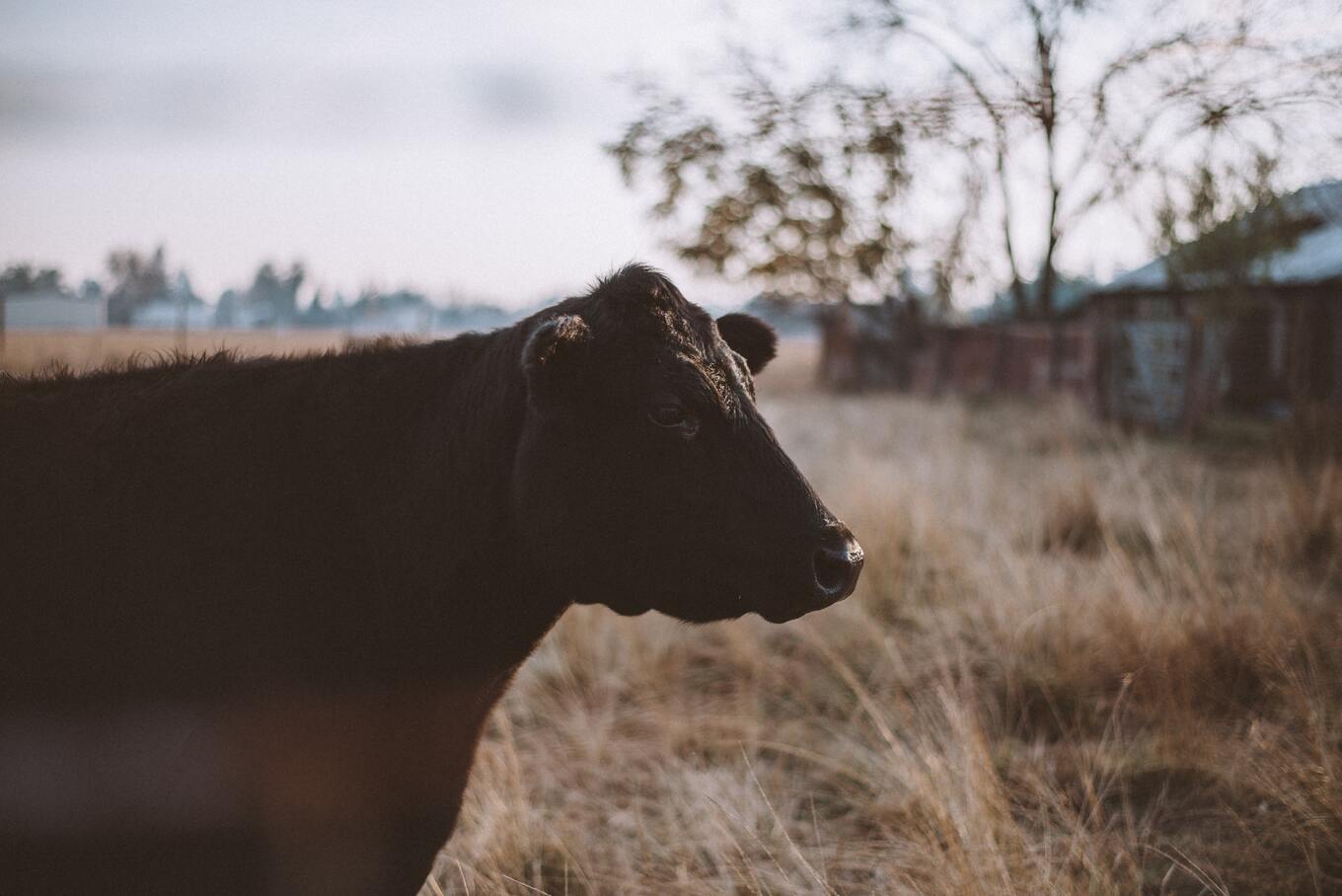 Pexels
Pexels
10 Animal agriculture is a leading driver of deforestation
Giving up animal products can benefit more than your health, it’s also a good choice for the planet, too. Right now, beef production is the leading cause of deforestation in the Amazon. In fact, one recent investigation discovered that in the last six years, 800 million trees in the rainforest have been cut down to clear land for beef production. Read more about the meat industry’s role in deforestation here.
11 Most of the soy linked with deforestation is produced for farm animals
You might have heard that soy production is also linked with significant rates of deforestation, and it is. But the vast majority of soy isn’t harvested for products like tofu or soy milk, it’s actually used for farm animal feed. In fact, 77 percent of the world’s soy goes to the livestock industry.
12 Animal agriculture is responsible for more emissions than aviation
Often, when we talk about individual emissions, the conversation turns to flying habits. And while it’s true that flying less would result in fewer emissions, eating fewer animal products would also have a big impact. In fact, the United Nations reports that the aviation industry is responsible for two percent of global emissions, and animal agriculture is responsible for 14.5 percent. Find multiple reports on emissions here.
13 Research suggests grass-fed beef is not a sustainable choice
Grass-fed beef is often spun as the more sustainable alternative to conventional beef, but some research suggests this isn’t true. All cattle farming is detrimental to the environment. “Grazing livestock are net contributors to the climate problem, as are all livestock,” Tara Garnett, PhD, of The Food Climate Research Network told the University of Oxford in 2018. “Rising animal production and consumption, whatever the farming system and animal type, is causing damaging greenhouse gas release and contributing to changes in land use.” Read more about claims like grass-fed and organic here.
 Pexels
Pexels
14 More than a third of the world’s fisheries are overfished
It’s not just farming animals on land that is depleting the planet, the fishing industry is also stripping the ocean of, well, its fish. According to the United Nations, we have now reached a point where one-third of the world’s fisheries have been pushed beyond their biological limits.
15 Fishing nets kill around 300,000 cetaceans every year
Bycatch and entanglement are also major problems in the fishing industry. Industrial nets often don’t just catch fish, but they also accidentally trap dolphins, whales, and porpoises, too. In fact, according to the World Wildlife Fund, entanglement in fishing gear is the leading threat to whales and dolphins, and results in around 300,000 deaths every year. It’s not just cetaceans that are threatened by fishing nets. Turtles, sharks, and seabirds are just a few more of the animals that frequently get caught up in nets and lines.
16 Sea animals are vital for fighting the climate crisis
Stripping the ocean of its sea life has major consequences for the planet. The ocean is the world’s biggest carbon sink, and it actually absorbs around 25 percent of all carbon dioxide emissions, which means that keeping it healthy is vital for fighting the climate crisis. Find more ocean facts that will help you swear off seafood here.
17 Every year, billions of animals are killed for the food industry
The number of animals killed for food each year is unfathomable. According to Viva!, more than one billion chickens, 15 million turkeys, and more than 10 billion pigs are killed in the UK alone. And around the world, it’s estimated that 1 trillion to 2.8 trillion fish are killed every year.
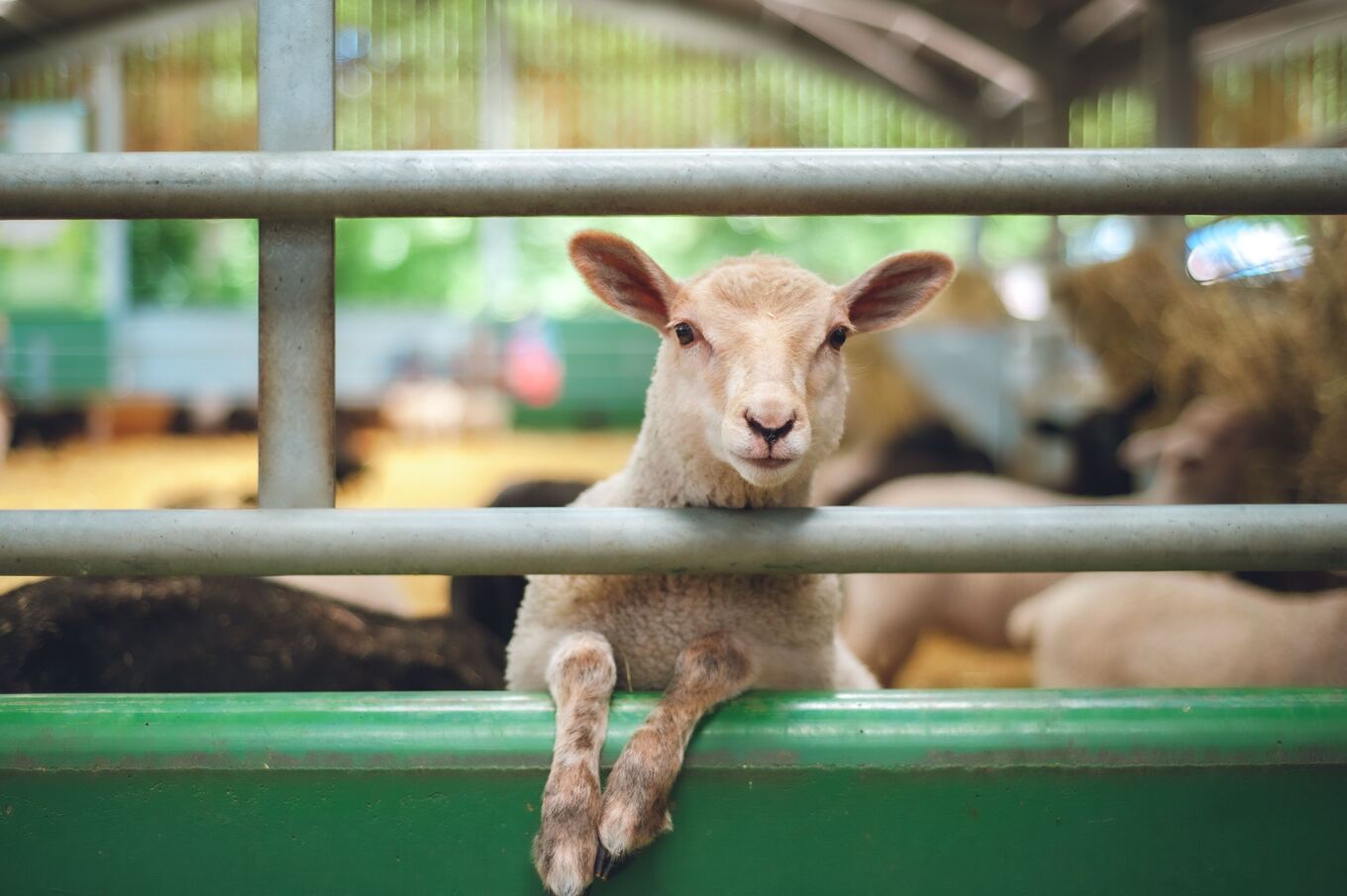 Unsplash
Unsplash
18 Most farm animals are raised on factory farms
While we like to picture farm animals living on green fields and spending their days running around and grazing, that isn’t actually how most of them live. In fact, most farm animals in the US spend their lives in industrialized, factory farm conditions. According to the FAIRR Initiative, as many as 99 percent of US animal products come from animals that were raised on factory farms.
19 Male chicks are killed in the egg industry
Eggs are often seen as a more compassionate food choice because the chicken doesn’t need to be killed to produce them. But on most factory farms, male chicks are seen as an unwanted byproduct of egg production, and so they are usually culled as soon as they have hatched. In fact, around 7 billion male chicks are killed every year in the egg industry.
20 And dairy cows are repeatedly impregnated and then slaughtered for meat
Just like the egg industry, the dairy industry isn’t without suffering. Dairy cows are repeatedly impregnated so that they can birth a calf and then produce milk. This usually happens until they are around five years old, and after that, they are sent to the beef industry, according to The Humane League.
21 The plant-based milk market is growing
Humans don’t have to drink cow’s milk at all, because we can make milk from plants. And vegan milks, including almond, oat, hemp, coconut, and soy, are more popular and more accessible than ever. In fact, the global market was valued at around $35 billion in 2021, and by 2030, it’s expected to reach more than $123 billion, according to Strategic Market Research.
22 Dairy is declining
While plant-based milk climbs in popularity, dairy consumption is declining. In 2021, dairy consumption hit an all-time low. And dairy farms are frequently closing. In 2023, it was revealed that in Wisconsin, where dairy is a major industry, around 10,000 dairy farms have been lost in the last two decades. In the last year alone, the state lost 400 dairy farms. Read more about the changing industry here.
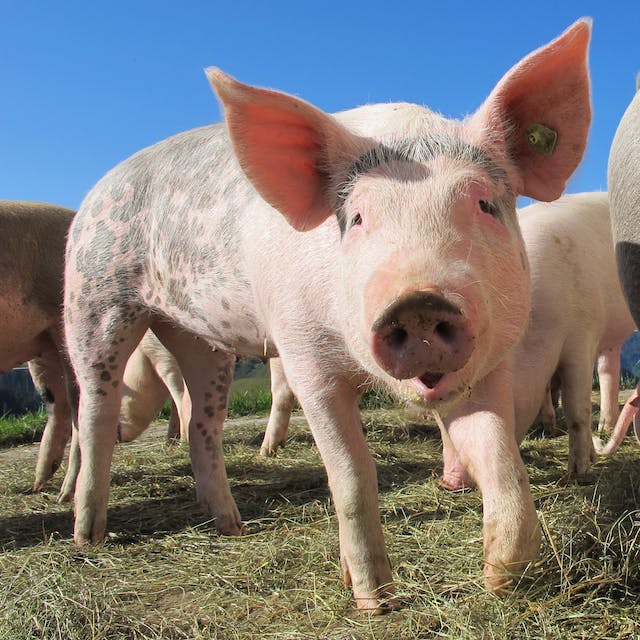 Pexels
Pexels
23 Pigs are more intelligent than dogs
Society treats pigs and dogs very differently, but they have plenty in common. They both enjoy affection, form bonds with humans, and they’re smart, too. In fact, research suggests pigs are actually more intelligent than dogs. Studies have shown that pigs have long-term memories, can tell the time, and can understand and learn from each other. And yet, every year, millions are slaughtered for meat. Pigs aren’t alone. Research and first-hand observation suggest that farm animals, including turkeys, chickens, sheep, and goats, can be affectionate, smart, and playful.
24 The meat industry exploits human beings, too
It’s not just animals that are hurt by the meat industry. Multiple investigations have found that Big Meat exploits human beings, too. “There have been a lot of human rights violations, different abuse allegations, discrimination allegations that have come up across the history of the [meat] industry,” Chloe Sorvino, a journalist for Forbes and author of the book “Raw Deal: Hidden Corruption, Corporate Greed, and the Fight for the Future of Meat,” told VegNews. “But at JBS [the world’s biggest meat processor], there are so many different examples.” The industry has also been linked with child labor on multiple occasions—read more about that here.
25 The plant-based meat market is expected to hit $33.3 billion by 2031
Those who love the taste of meat don’t have to engage with Big Meat, instead, they can choose from the growing range of vegan meat products on the shelves. In fact, according to Allied Market Research, by 2031, this sector of the plant-based food industry could exceed $33 billion. Read more about vegan meat here.
26 And the wider plant-based food market could reach $162 billion by 2030
In 2021, a “groundbreaking report” from Bloomberg Intelligence noted that the entire plant-based food market could soar from $29.4 billion to $162 billion within the decade. Bloomberg Intelligence Senior Consumer Staples Analyst, Jennifer Bartashus, “Food-related consumer habits often come and go as fads, but plant-based alternatives are here to stay – and grow.”
 Unsplash
Unsplash
27 Half of young Americans are flexitarian, according to one study
The flexitarian diet is growing in popularity (find out more about that here). In the US, more than half of young Americans, aged between 24 and 29, describe themselves as flexitarian, according to a One Poll study from 2021.
28 Eating vegan can actually save you money
If you have access to whole foods, like canned beans and other legumes, grains, fruits, and vegetables, then research suggests eating a plant-based diet can actually save you money. In 2021, one study from Oxford University, which focused only on whole foods and not expensive vegan meat products, found that eating plant-based in the US, the UK, Australia, and across Western Europe, could food bills by up to one-third.
29 Nearly half of all US restaurants now offer vegan choices
For years, it has been hard to eat out as a vegan, but we’re thrilled to say that times are changing. If you do fancy splashing the cash on a meal out, then it’s easier than ever to do so. In fact, research in 2023 found that nearly 50 percent of all restaurant menus in the US have vegan options. Find out more about the study here.
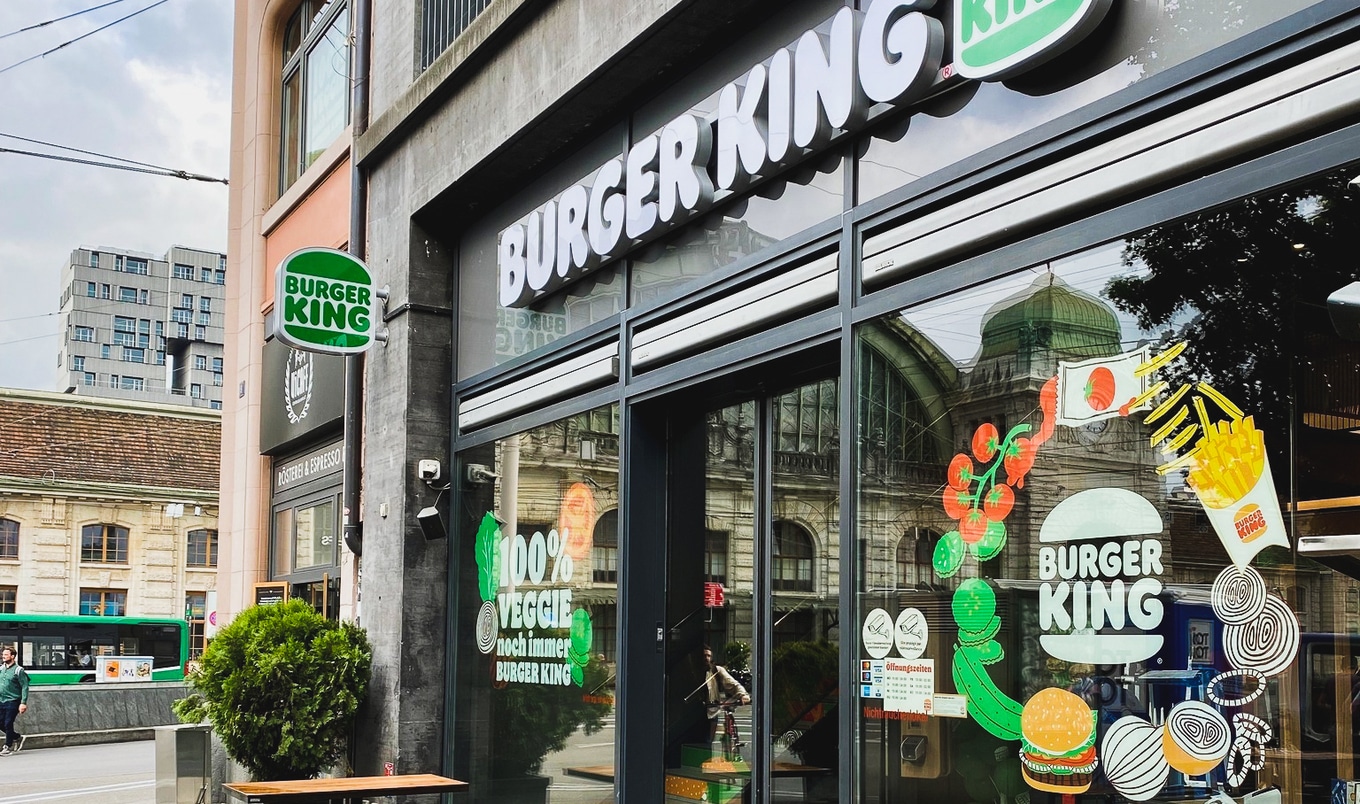 The Vegetarian Butcher
The Vegetarian Butcher
30 And the fast-food industry is more vegan-friendly than ever
If you told us 10 years ago that vegan fast food would be everywhere in 2024, we’d have been amazed. But it’s the truth. In the US, both Burger King and White Castle offer the Impossible Burger, for example, and in the UK, you can find vegan options at McDonald’s, KFC, Burger King, Pizza Hut, and many more fast food spots. Burger King has even opened multiple meat-free locations in several countries around the world. What a time to be alive.
31 In fact, it’s easier than it has ever been to follow a plant-based diet
The truth is, now is a great time to switch to a plant-based diet, because vegan products are everywhere. There is also more support than ever before, especially if you sign up for Veganuary. Find out more about how to go vegan for the month of January (and beyond) here.
For more vegan motivation, read:
JUMP TO ... Latest News | Recipes | Guides | Health | Subscribe




